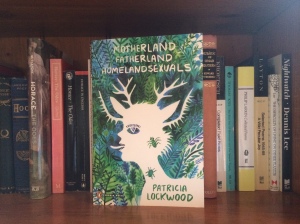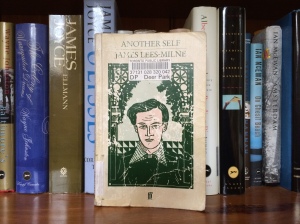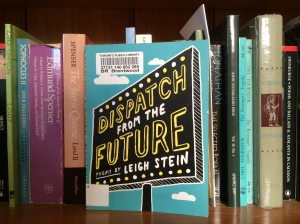Is Canada the Brains of North America?
Patricia Lockwood, Motherland Fatherland Homelandsexuals (2014)
As Willie Nelson observes somewhere or other, “You can’t write a song if you ain’t got nothing to say.” Fortunately, poetry has outgrown such trite restrictions. In fact, for many contemporary poets, it would seem that having nothing to say – or having arrived at the conclusion that there’s no point in trying to say anything because saying something is embarrassingly unhip – is not a disqualification, but rather the base camp from which the writing of poetry sets out.
Patricia Lockwood falls into this category: it’s difficult to say that any specific poem of hers is “about” something (with perhaps one major exception). The materials of life and, in particular, popular culture are certainly present in her work, but they enter in an oblique or tangential manner, and her poems don’t appear to be addressed to things external to themselves in a conventional way; rather, they seem more interested in the makings of poetry itself – they are about language and metaphor and the odd jumps thought can take; they are enactments and illustrations of their own construction; they show off their seams and sutures rather than trying to disguise them. Some are extended riffs that repeat the same idea, the poet seeming to look on with amusement as the idea becomes more outrageous with each iteration (see the second poem below).
Most gratifyingly, Lockwood seems to have a minor obsession with Canada. We’ve considered her work before; this collection contains two poems that explicitly (and I used that word advisedly – consider that your NSFW warning) refer to Canada. Here’s the first (minus the proper line indentations, which I haven’t been able to maintain online):
Search “Lizard Vagina” and You Shall Find
A higher country has a question, a higher
country searched and found me, and the name
of the country was north of me, Canada.
When I think of you I think up there just as I
think when I think of my brain, my brain
and the bad sunning lizard inside it. Today
you searched “lizard vagina,” Canada. It is so
hugely small if you can imagine it; it is scaled
it is scaled so far down. It evolved over many
millions of years to be perfectly invisible to you;
and so you will never see it, Canada. Here is
some pornography, if it will help: tongues flick
out all over the desert! Next time try thunder
lizard vagina. That will be big enough for even
you, Canada. You have one somewhere
in your hills, or else somewhere in your badlands.
Perhaps someone is uncovering a real one right
now, with a pickaxe a passion and a patience.
Ever since she was a child she knew what she
would do. She buttons her background-colored
clothes, she bends down to her work;
keep spreading,
Canada, she will show you to yourself.
Your down there that is, my Up There. Oh South oh
South oh South you think, oh West oh West now West
say you. The pickaxe the passion and the patience
hears, pink tongue between her lips just thinking.
The stones and the sand and the hollows they watch
her. The tip of her tongue thinks almost out loud,
“I have a brain am in a brain brain suns itself in lizard
too. Where would I be if I were what I wanted?”
Has a feeling finally swings the pickaxe- the passion-
and the patience-tip down. (3-5)
Canada plays such a large role in this poem that we could almost say it is “about” Canada, or at least about the speaker’s thoughts about Canada – except that we have already disposed of the idea that poems are “about” anything. But given the frequent use of “you” and “Canada” in apposition to one another, we can at least say the poem is addressed to Canada.
The speaker’s actual ideas about our country, however, aren’t especially unique. In the opening lines, there is a cluster of words and phrases associated with Canada: “higher,” “north of me,” “up there” – ideas which seem typically American, and also rather pedestrian, since Canada is, after all, directly north of the U.S. It’s mildly interesting to see how “up there” shades into the brain, as if to suggest Canada is a more rational or intellectual nation than the U.S.
The line “that will be big enough for even / you, Canada” picks up on another common idea, that Canada is geographically large; the same idea occurs (among other places) in Sylvia Plath’s poem “Crossing the Water,” where the size of trees is conveyed by saying that “their shadows must cover Canada”.
But none of this comes as news.
The real crux of the poem, at least for our purposes, is the question of why Canada would search “lizard vagina” in the first place. And yet here, just when the question, “What is she really saying about Canada?” becomes most urgent, the answer becomes most elusive. Why would Canada search “lizard vagina”? Why would anyone? I can’t say I know.
One can, however, consult a list of what Canadians searched for in 2013 (the book was published in 2014, so I’m assuming 2013 would be the most relevant year) – even without “lizard vagina,” the results are somewhat dispiriting.
The Fifty-First State?
Canada also makes an appearance in a later poem, though we’re peripheral rather than central in this one.
Revealing Nature Photographs
In a field where else you found a stack
of revealing nature photographs, of supernude nature
photographs, split beaver of course nature photographs,
photographs full of 70s bush, nature taking come
from every man from miles around, nature with come back
to me just dripping from her lips. The stack came
up to your eye, you saw: nature is big into bloodplay,
nature is into extreme age play, nature does wild inter-
racial, nature she wants you to pee in her mouth, nature
is dead and nature is sleeping and still nature is on all fours,
a horse it fucks nature to death up in Oregon, nature is hot
young amateur redheads, the foxes are all in their holes
for the night, nature is hot old used-up cougars, nature
makes gaping fake-agony faces, nature is consensual dad-
on-daughter, nature is completely obsessed with twins,
nature doing specialty and nature doing niche, exotic females
they line up to drip for you, nature getting paddled as hard
as you can paddle her, oh a whitewater rapid with her ass
in the air, high snowy tail on display just everywhere.
The pictures were so many they started to move. Let me
watch for the rest of my natural life, you said and sank down
in the field and breathed hard. Let me watch and watch
without her knowing, let me see her where she can’t see me.
As long as she can’t see me, I can breathe hard here forever.
See nature do untold animal sex, see nature’s Sicko Teen
Farm SexFeest, see her gush like the geyser at Yellowstone,
see the shocking act that got her banned in fifty-one states including
Canada. See men for miles around give nature what she needs,
rivers and rivers and rivers of it. You exhale with perfect
happiness. Nature turned you down in high school.
Now you can come in her eye. (33)
That might be my favourite poem in the whole book, and it mentions Canada. Sometimes, things just work out.
Canada is the fifty-first state being referred to here – as the phrase “fifty-one states including Canada” makes clear. It’s sad, obviously, being demoted from an independent nation to an add-on to the U.S.; this does, however, represent another typical American attitude – that Canada is essentially the same as the U.S. and not really anything more than a geographical extension of their country. Perhaps we can tell ourselves that Lockwood is parodying that idea rather than presenting it straightforwardly.
So, what can we conclude overall about Lockwood’s view of Canada? Despite the excitement of a poem literally directed towards us, we don’t get much new: Canada is up north, Canada is big, Canada is (perhaps) a more rational nation than the U.S. – the old “peace, order and good government” idea – but at the same time it’s so similar to the U.S. that it’s really just another state. Though Lockwood seems to be considered one of America’s exciting new poets, her ideas about Canada are rather retrograde.
But there’s another Canadian reference worth considering…
Canada as Marketing Device
What is perhaps this book’s most interesting reference to Canada is not in the book at all, and was probably not even written by Lockwood; instead, it comes on the back cover:
In case you can’t read that, the second line says, “Is America going down on Canada?”
What does this mean in the context of back cover blurbery?
The purpose of back cover copy, obviously, is to get people intrigued enough to buy the book. And sex sells, as they say, so it’s not surprising that there would be a reference to sex on the back cover. (In fact, all the questions on the back cover have at least a tangential relation to sex.) Which means that someone, somewhere (in the Penguin marketing department, presumably) decided the question of whether the U.S. is performing oral sex on Canada (along with questions about deer porn and Whitman’s tit pics) might make people want to buy the book.
Which is a striking enough thought in itself: are Americans really so interested in the issue of Canada-U.S. (sexual) relations that this line would make them more likely to purchase a poetry collection? It’s certainly a flattering thought.
But even more striking are the sexual roles in which our countries are placed. In the book itself, Canada is the fifty-first state, which suggests that Americans unconsciously feel a certain power over, and ownership of, us. On the back cover, however, the standard power relation between Canada and the U.S. is reversed. Canada isn’t the passive one, trying to please the U.S.; instead, our big, powerful neighbour to the South is going down on us. This suggests that Canada has some sort of power, some mysterious, irresistible appeal, that makes the U.S. want to please us. But what is it?
Canada as Hipster Talisman
Canada plays a large role in Lockwood’s book, and is prominently featured on the back cover, because Lockwood is a hipster, and American hipsters are obsessed with Canada.
The evidence for this has been mounting for a while – just the examples we’ve considered here include Lockwood herself, Tao Lin, Michael Robbins, Leigh Stein, and a series of New Yorker cartoons (proto-hipsterism). And even beyond the borders of our little website, there are facts that can’t be ignored: Canadian Ryan Gosling is essentially the ultimate male hipster, there is a hipster record company called Secretly Canadian, and so on. Now seems an opportune time to take up the question directly: why is Canada so significant to American hipsters?
What gives Canada its hipster cachet is precisely its oddness, its difference, the fact that it is like the U.S. and yet not the U.S. We stand at a slight angle to the U.S., off to the side as it were, and of necessity we look a bit askance at mainstream U.S. culture, understanding it and consuming it but not precisely of it. In other words, Canada as a nation perfectly incarnates the intellectual state that hipsters aspire to, because what hipsters desperately want is to be different, not average but somehow special or set apart from everyone else – “everyone else” meaning mainstream Americans.
But simply standing apart isn’t enough; the essence of hipsterism is using your appearance and your interests to convey to everyone else the fact that you stand apart from mainstream American culture. There’s no point in being a unique individual if no one notices; you must also appear to be a unique individual (and in some cases, no doubt, the appearance comes ahead of the reality by a significant distance), and appear so in a graphic enough way that everyone around you recognizes your uniqueness. This is what hipsters strive so hard for, growing beards and getting tattoos and piercings and waxing their moustaches and buying music only on vinyl and making their own clothes and whatever else they do – and what they strive so hard to achieve, Canadians have already achieved simply by being Canadian.
The Canadian is, in fact, both the original and the ultimate hipster because by definition we stand outside mainstream American culture. And we achieve our hipsterism without effort – a key point because the least cool thing in the world is trying to be cool. Canadians are the true hipsters – we are, in fact, born hipsters – and American hipsters are, in the end, nothing more than imitation Canadians, striving to acquire a status that comes to us effortlessly, as part of our very essence.
(As a side note: The subconscious yearning, on the part of American hipsters, to be Canadian was perhaps best expressed in this map that circulated a few years ago:
In it, we see how the “hip” parts of the United States – essentially the Northeast, part of the Midwest and the West coast – have unilaterally attached themselves to Canada, abandoning the rest of the U.S. to “Jesusland”.
My recollection is that this map began to circulate after the re-election of George W. Bush, and that at the time it represented a desire on the part of more moderate, left-leaning Americans to escape from what they felt was their country’s slide into religious conservatism and overseas war-mongering. From that perspective, it represents a typically American view of Canada as a more moderate, progressive and pacifist nation, still similar enough to the U.S. to make a merger easy, but different in precisely the ways that Kerry voters wished their own country could be different. Some even became – or at least claimed to have become – willing to rush into the warm, moderate embrace of their snow-bound neighbour to the North.
But even beyond its immediate political context, the map represents a statement by a certain portion of the U.S. (essentially, the part of the nation that contains most of the hipsters) that they are not a part of mainstream America, but more open-minded, more liberal, more multicultural – in short, that they are more like Canadians than Americans.)
For hip Americans, Canada is like a distorting mirror that shows them, not who they actually are, but the image of the unusual, exciting person they want to be. In other words, the simplest definition of a hipster would be, “An American who wants to be Canadian.”
The Agonies of the Writing Process
Coming full circle at last, here is the Willie Nelson song that contains his thoughts on the necessity of a writer having something to say:
I’ve always thought of it as a portrait of Willie wrestling with writer’s block, but no doubt there are other possible interpretations.




